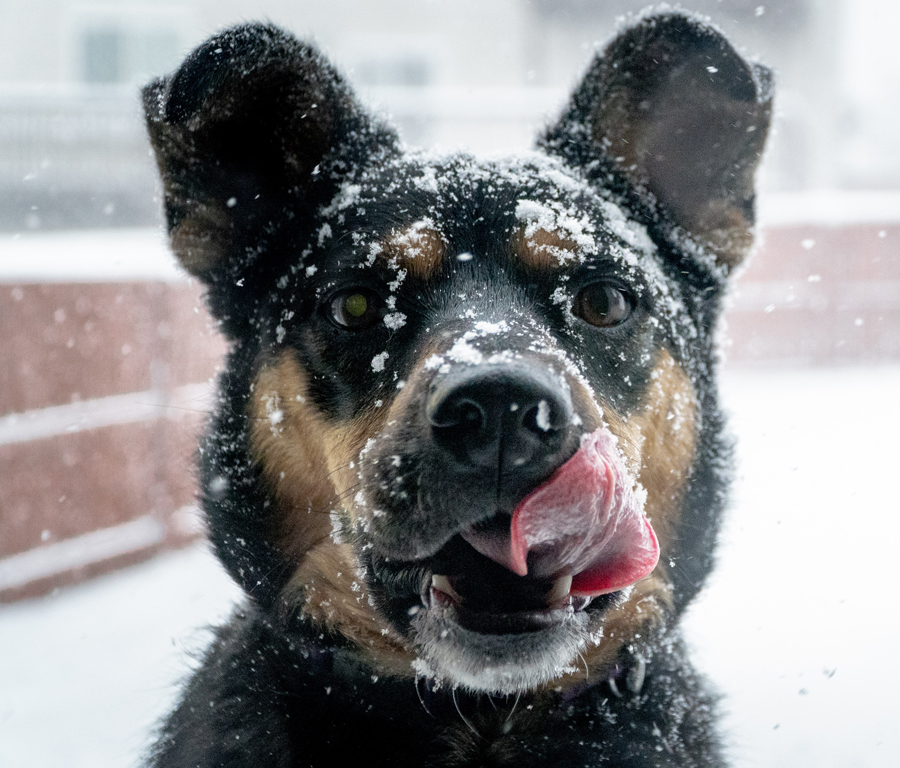10 Tips to Keep Your Pet Healthy, Safe & Happy All Winter Long

Baby, it’s cold outside! The chill of winter has finally hit CT, and just like us, your dogs are probably well aware—especially if they spend any time outdoors. And also like us, the harsh weather can adversely affect your furry family members if you’re not prepared for it. To keep your pets happy and healthy all season long, here are 10 winter-weather pet care tips to remember:
- If it’s too cold for you, it’s too cold for them. Many people think that their pets are built to withstand the cold, but this isn’t always the case. Just like us, our pets can suffer from the dangers of winter, and that includes frostbite and hypothermia. Short-haired dogs especially don’t have enough fur to protect them from the chill, and short-legged dogs may have more contact with the snow along their core. For dogs with medical conditions like arthritis and diabetes, the cold can also exacerbate their symptoms or prevent them from regulating their body temperature.
If your pooch is whining, seems anxious, shivering, slows down or stops moving, or begins to look for a place to burrow, bring them inside immediately: these are signs of hypothermia. In fact, on very cold days, it’s best to allow your animals outside just long enough to relieve themselves. No pet should be left outside to suffer.
- Check & wipe those paws! When temps drop, your dog’s paws are susceptible to cracking, and bleeding, and can accumule painful ice balls if there’s snow on the ground. They also are exposed to toxic deicers, walkway salt, and other chemical agents, which can lead to irritation or accidental ingestion. Be sure to check their paws for damage or signs of frostbite, and give them a wipe down to remove chemicals when they return inside. To prevent chapping and cracking, you can apply a little petroleum jelly or other paw protectant, or gear them up with a pair of properly-fitting booties before you head out.
- Scale Back Your Bathing & Grooming Schedule. Just like humans, winter can be rough on your dog’s skin. Between the cold air outdoors and the dry heat inside, your pooch’s skin can become dry and itchy. Limit baths to as little as possible to prevent washing away essential protective oils and consider using a humidifier to keep dryness at bay while inside. Likewise, refrain from clipping your dog’s coat too short — keep it to just a trim to keep ice and snow from clinging to longer fur.
- Bundle Up! Short-haired dogs can especially benefit from a dog coat or sweater in the colder months, but if your long-haired dog seems bothered by the cold, consider getting one for them as well. In fact, since a damp coat can make a dog even colder, it’s smart to keep several on hand so you always have a dry one ready.
- Give Them A Warm Bed. Homes can become drafty during the winter and that favorite snoozing spot can suddenly become less pleasant. Make sure your dog’s bed is in a warm and cozy location—you can even offer a few for them to choose their optimum comfort. Keep in mind, using space heaters or heated blankets and pads is not recommended for pets—they can cause unintentional burns.
- Feed Them Well—and Appropriately. Dogs that spend active time outside burn a lot of extra energy just to stay warm. You may notice they’re asking for a little more food than usual—go ahead and give it to them, they need it to stay sated. For dogs that prefer to stay snug inside, keep their diets steady. Dogs don’t need added weight to stay warm; it’s more important to keep them at a healthy weight all year long. And always make sure they have plenty of fresh water available—staying hydrated can help with itchy, dry winter skin.
- Make Sure They are Collared & Chipped. While this is true year-round, it’s especially crucial in winter. Many pets get lost and disoriented because snow and ice skews the scents that help them to recognize their way home. A collar with identification and contact info as well as a registered microchip can help your furry friend get back to you should they become lost.
- Leave Them Home. Just like in the summer, the temps in your car can change drastically. Your vehicle can turn into a refrigerator while you tend to your errands, leaving your dog uncomfortable, prone to frostbite and hypothermia, and in worst-case scenarios, they may even freeze to death. It’s simply not worth the risk—if you plan on leaving them in the car, don’t. Just leave them home instead.
- Pet-Proof Your House. With so much time spent at home, there’s more or of a risk of poisoning. Make sure there’s no spilled antifreeze in the garage, keep chemicals and medications out of reach, and be mindful of houseplants and human foods that can be dangerous for your pets to eat.
- Get A Wellness Check. The winter is as good a time as any to check in with your veterinarian. A check-in during the winter can help you be mindful of existing medical conditions—especially if they worsen during the cold.

Remember, dogs like to get cozy during the winter months just like us. Follow the ten tips above and you and your fur babies are sure to enjoy a happy, healthy, and comfy winter—and be ready to hit the great outdoors at the first signs of spring.
